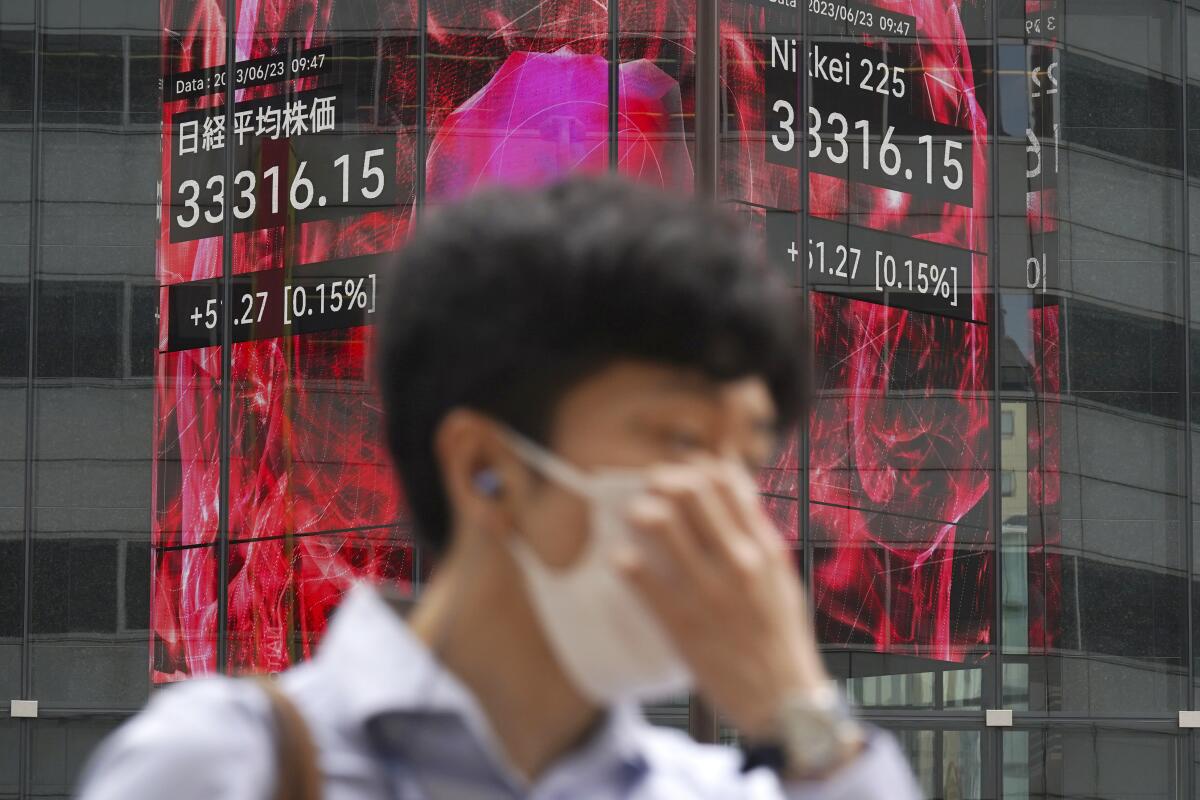Wall Street falls to close out its first losing week in the last six

- Share via
Another drop for stocks Friday helped drag Wall Street to its first losing week in the last six.
The Standard & Poor’s 500 fell 33.56 points, or 0.8%, to 4,348.33, pulling back further from last week when it reached its highest level in more than a year. The Dow Jones industrial average dropped 219.28 points, or 0.6%, to 33,727.43, and the Nasdaq composite sank 138.09 points, or 1%, to 13,492.52.
Overseas markets also fell, while crude oil prices slipped amid worries that a stressed global economy may burn less fuel.
Europe’s economy appears to be weaker than expected, according to a preliminary report measuring manufacturing and services businesses. That added to the week’s hesitance in markets, caused by a crank higher in interest rates by central banks around the world as they try to get high inflation under control. High rates drive down inflation by slowing the economy, which raises the risk of a recession.
High interest rates in the United States have already dragged manufacturing and other industries into contraction, while also helping to cause several failures in the banking system that rattled confidence. Federal Reserve Chair Jerome H. Powell said this week that even though his central bank didn’t raise rates last week, it could still push through a couple of more increases by the end of this year.
Critics have also said the U.S. stock market was due for a breather after it climbed too far, too fast after a rally of more than 20% since mid-October. The S&P 500 just broke its longest weekly winning streak since November 2021.
Much of the exuberance was because the U.S. economy had managed to avoid a recession, even though the Fed has raised rates at a breakneck pace since early 2022. The job market in particular has remained remarkably solid.
Wall Street’s hope has been that slowing inflation could get the Fed to take it easier on rates, while a small cadre of stocks soared to incredible heights amid a frenzy around artificial intelligence technology.
Wall Street traders for the most part are still expecting fewer rate increases this year than what the Fed has suggested. They may once again be underestimating the Fed’s resolve, economist Ethan Harris wrote in a BofA Global Research report.
“Early in the hiking cycle, the focus was on avoiding a recession,” he said. “However, with persistently high inflation, the focus has shifted from erring on the side of doing too little to doing too much.”
A preliminary report Friday indicated the overall U.S. economy is continuing to grow, even though manufacturing is shrinking and its output fell to a five-month low.
“The question remains as to how resilient service sector growth can be in the face of the manufacturing decline and the lagged effect of prior rate hikes,” said Chris Williamson, chief business economist at S&P Global Market Intelligence. “Any further rate hikes will of course have a further dampening effect on this sector, which is especially susceptible to changes in borrowing costs.”
A slower economy could mean pressure on demand for energy, and the price for a barrel of benchmark U.S. oil fell 35 cents to $69.16 after paring earlier, sharper losses. Brent crude, the international standard, dipped 29 cents to $73.85 a barrel.
On Wall Street, tech companies were hit hard. Higher interest rates hurt all kinds of investments, such as stocks, bonds, and crypto, but high-growth stocks tend to be among the most affected.
Strikes against Starbucks stores get all the publicity, but a mass strike by UPS workers could be the turning point for American labor.
A 1.4% drop for Microsoft and 3% fall for Tesla were the two heaviest weights on the S&P 500. Nvidia, one of the biggest beneficiaries of the AI boom, fell 1.9% and was the third-heaviest weight on the index. It’s still up nearly 189% for the year.
On the winning side of the stock market Friday was CarMax. It jumped 10.1% after reporting much stronger profit for the latest quarter than analysts expected.
Coinbase rose 6.9% after winning a Supreme Court case. The crypto-trading platform wanted to keep a dispute with a customer in arbitration, a process that many companies prefer over lawsuits in courts.
Among European stock markets, Germany’s DAX lost 1%, France’s CAC 40 fell 0.6% and the FTSE 100 in London slipped 0.5%.
On Thursday, the Bank of England raised its main interest rate by a bigger margin than expected to a 15-year high. It was the central bank’s 13th straight increase. Central banks in Norway, Switzerland and Turkey also raised borrowing rates.
In Asia, Hong Kong’s Hang Seng index lost 1.7%. Stocks have slid there as China’s economic recovery stumbles after the relaxation of anti-COVID restrictions.
Japan’s Nikkei 225 dropped 1.5% after its inflation rate came in higher than expected. That added to expectations that its central bank might adjust policies that have kept interest rates ultralow. The Bank of Japan has kept its benchmark interest rate below zero to encourage more investment and spending.
In the bond market, yields dropped as investors looked for safer places to park cash amid worries about the economy. The yield on the 10-year Treasury fell to 3.73% from 3.79% late Thursday. It helps set rates for mortgages and other important loans.
AP writers Matt Ott and Elaine Kurtenbach contributed to this report.
More to Read
Inside the business of entertainment
The Wide Shot brings you news, analysis and insights on everything from streaming wars to production — and what it all means for the future.
You may occasionally receive promotional content from the Los Angeles Times.











